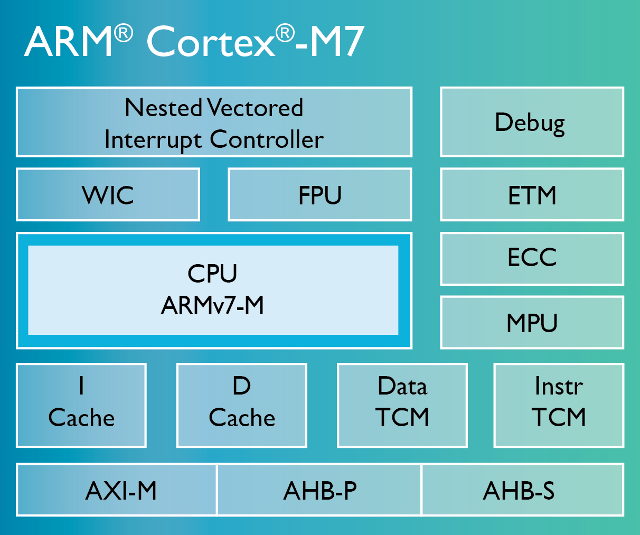ARM has just announced Cortex-M7 processor based on ARMv7-M architecture, with double the compute and digital signal processing (DSP) capability of ARM Cortex M4. The latest ARM MCU core targets IoT and wearables applications for the automotive, industrial, and consumer markets including motor control, industrial / home / factory automation, advanced audio, image processing, connected vehicle applications, and so on.

Cortex-M7 comes with enhanced DSP instructions, a better FPU (FPv5 with single and double precision support), and tight coupled memory compared to Cortex-M4, according to an Anandtech article. ARM Cortex-M7 also achieves 5 CoreMark/MHz against 3.41 CoreMark/MHz for Cortex M4, and up to 3.23 DMIPS/MHz against up to 1.95 DMIPS/MHz.
ARM Cortex-M7 features listed in the press release:
- Six stage, superscalar pipeline delivering 2000 Coremarks at 400MHz in a 40LP process.
- AXI interconnect (supports 64-bit transfer) and fully integrated optional caches for instruction and data allowing efficient access to large external memories and powerful peripherals.
- Tightly coupled memory interfaces for rapid, real-time response.
- Extensive implementation configurability to enable a wide range of cost and performance points to be targeted.
- Optional full instruction and data trace via the Embedded Trace Macrocell enabling greater system visibility.
- An optional safety package and built-in fault detection features contribute toward ASIL D (Automotive Safety Integrity Level) and SIL 3 (Safety Integrity Level) compliance.
- Third-party tools, RTOS, middleware support of any architecture, provided by the ARM Connected Community of complementary partner companies.
Cortex-M7 remains binary compatible with older Cortex-M processors, so system designers can take advantage of code reuse in order to lower development and maintenance costs. Available tools include Keil microcontroller development kit (MDK) and ULINK debug adapter, and various real-time operating systems will be supported such as Express Logic ThreadX, FreeRTOS, Mentor Graphics Nucleus, or Micrium µC/OS-III.
Atmel, Freescale and ST Microelectronics will be the first companies to release MCUs based on Cortex-M7.
You can find more details on the Anandtech article, or ARM Cortex-M7 product page.

Jean-Luc started CNX Software in 2010 as a part-time endeavor, before quitting his job as a software engineering manager, and starting to write daily news, and reviews full time later in 2011.
Support CNX Software! Donate via cryptocurrencies, become a Patron on Patreon, or purchase goods on Amazon or Aliexpress




